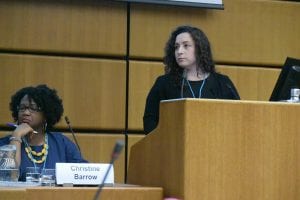Multi-Agency Approach Key To Curbing Human Trafficking

Ketty Fernandez speaking at the International Police Executive Symposium held at the United Nations in Vienna, Austria.
Greater Orlando’s multi-agency approach to stopping human trafficking is the topic of a paper authored by members of UCF’s Department of Sociology.
Florida currently ranks third in the U.S. for human trafficking, a form of modern-day slavery. The more common reasons for trafficking are for sex — similar to prostitution — and for working long hours in areas like harvesting crops or domestic help.
Orlando’s approach to fighting human trafficking combines the resources of several agencies to form the Metropolitan Bureau of Investigation (MBI), which deals with human trafficking and other crimes throughout Orange and Osceola Counties. MBI personnel work closely with social service agencies like the Department of Children and Families, and nonprofit non-government agencies such as The Florida Abolitionist and The Greater Orlando Human Trafficking Task Force, to combat human trafficking in Central Florida.
How this model works in the Greater Orlando community is the topic of a recent paper presented at the International Police Executive Symposium held at the United Nations in Vienna, Austria. Ketty Fernandez, co-author of “United We Stand: Collaborations to Combat Human Trafficking in Central Florida,” along with Jay Corzine, Lin Huff-Corzine, Madelyn Diaz, Jolene Vincent, and Tomas Lares, presented the paper. Fernandez said the experience of presenting at the United Nations was amazing, though a bit intimidating.
“Hopefully sharing how our community has organized to combat human trafficking can be useful for other countries as we combat the atrocities associated with it,” Fernandez said.
The team’s human trafficking research caught the attention of leadership at Arizona State University’s McCain Institute. They will be funding a weeklong set of events sponsored by the Knights for Social Justice March 25-29, 2019.
“All events will be open to the public. We want to bring attention to human trafficking and our efforts to fight it at the University, as well as in the larger Orlando community,” Huff-Corzine said.
